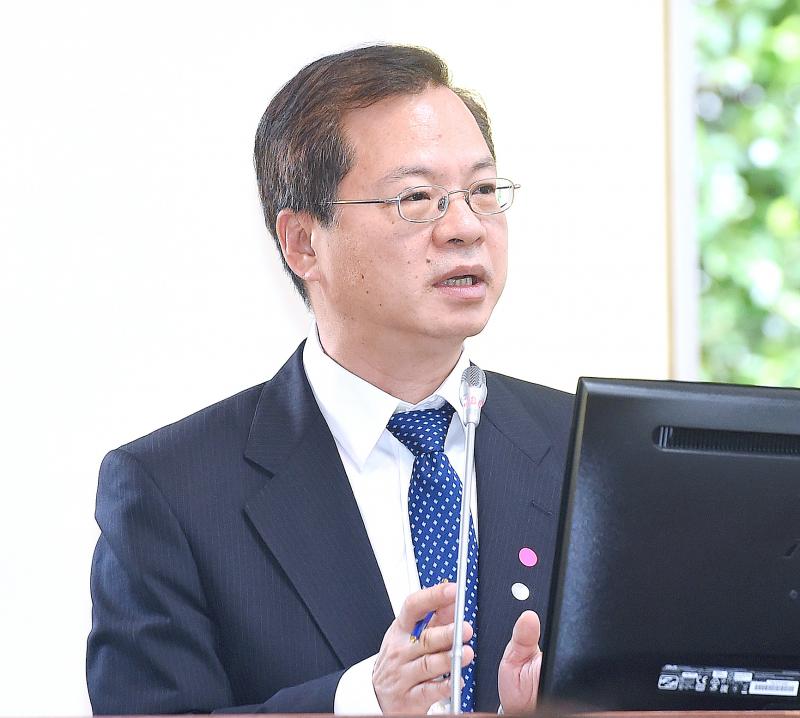The National Development Council (NDC) is considering creating a business climate index on Taiwan’s property market, allowing policymakers to better monitor market movements and intervene if necessary, NDC Minister Kung Ming-hsin (龔明鑫) said yesterday.
Kung made the remarks at a meeting of the legislature’s Economic Committee where lawmakers from across party lines voiced concerns about housing price hikes driven by capital repatriation.
Kung said that the council is assessing the possibility of creating an index designed to provide more accountable and transparent information than data provided by private-sector market analysts, and could help improve policymaking.

Photo: Liao Chen-huei, Taipei Times
The council would compile a report on the matter within a week, Kung said, but declined comment on whether the local property market is overheated and requires government action, due to unclear data.
The housing price to annual income ratio in Taiwan has dropped from 9.46 to about 8, suggesting that the market in most areas is stable, Kung said.
Housing prices in Taipei still lag behind the peaks in 2014, but are approaching new highs in Taichung, he said, adding that housing prices are also relatively high in Tainan and Kaohsiung.
The upward trend has drawn attention from the central bank, the Ministry of Finance and the Ministry of the Interior, and led to discussions among the agencies, Kung said, adding that the council is moderating the conversation.
The finance ministry has said it would not extend favorable tax conditions that are due to expire in August next year to attract capital return.
Capital repatriation is believed to have fostered this year’s property boom, while trading elsewhere in the world is taking a hit amid the COVID-19 pandemic, analysts have said.
Kung said that it has not yet been decided whether the real estate climate gauge should take the form of an index, an indicator or another form.
The government has to be careful on the issue because tightening measures might hamper the economy, Kung said.

Sweeping policy changes under US Secretary of Health and Human Services Robert F. Kennedy Jr are having a chilling effect on vaccine makers as anti-vaccine rhetoric has turned into concrete changes in inoculation schedules and recommendations, investors and executives said. The administration of US President Donald Trump has in the past year upended vaccine recommendations, with the country last month ending its longstanding guidance that all children receive inoculations against flu, hepatitis A and other diseases. The unprecedented changes have led to diminished vaccine usage, hurt the investment case for some biotechs, and created a drag that would likely dent revenues and

Global semiconductor stocks advanced yesterday, as comments by Nvidia Corp chief executive officer Jensen Huang (黃仁勳) at Davos, Switzerland, helped reinforce investor enthusiasm for artificial intelligence (AI). Samsung Electronics Co gained as much as 5 percent to an all-time high, helping drive South Korea’s benchmark KOSPI above 5,000 for the first time. That came after the Philadelphia Semiconductor Index rose more than 3 percent to a fresh record on Wednesday, with a boost from Nvidia. The gains came amid broad risk-on trade after US President Donald Trump withdrew his threat of tariffs on some European nations over backing for Greenland. Huang further

Nvidia Corp’s GB300 platform is expected to account for 70 to 80 percent of global artificial intelligence (AI) server rack shipments this year, while adoption of its next-generation Vera Rubin 200 platform is to gradually gain momentum after the third quarter of the year, TrendForce Corp (集邦科技) said. Servers based on Nvidia’s GB300 chips entered mass production last quarter and they are expected to become the mainstay models for Taiwanese server manufacturers this year, Trendforce analyst Frank Kung (龔明德) said in an interview. This year is expected to be a breakout year for AI servers based on a variety of chips, as

HSBC Bank Taiwan Ltd (匯豐台灣商銀) and the Taiwan High Prosecutors Office recently signed a memorandum of understanding (MOU) to enhance cooperation on the suspicious transaction analysis mechanism. This landmark agreement makes HSBC the first foreign bank in Taiwan to establish such a partnership with the High Prosecutors Office, underscoring its commitment to active anti-fraud initiatives, financial inclusion, and the “Treating Customers Fairly” principle. Through this deep public-private collaboration, both parties aim to co-create a secure financial ecosystem via early warning detection and precise fraud prevention technologies. At the signing ceremony, HSBC Taiwan CEO and head of banking Adam Chen (陳志堅)